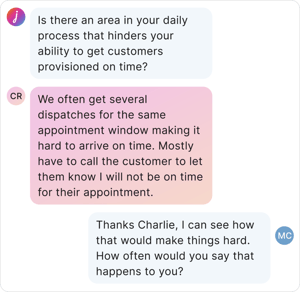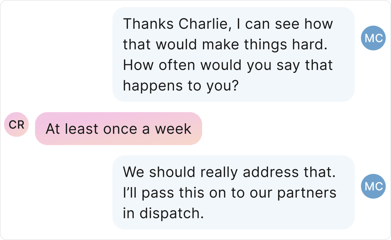Tips for responding to feedback
Personalize, dig deeper, and indicate action when responding to audience member comments.
As a facilitator, you play a critical role in ensuring the success of a campaign. Being part of a conversation empowers you to have an immediate effect on your participants. You can give insight, provide clarity, answer questions, or offer resources.
You also play a critical role in drawing out actionable themes. The more you ask questions and seek clarification, the better the comments and themes will be. This provides more opportunities for macro-level action.
Good responses have the power to get the information your organization needs, make your team feel empowered, and create a good attitude around open feedback. Poor responses can miss valuable information, make the person feel ignored, and create a cynical attitude about feedback and future conversations.
Below you'll find top tips to make sure everyone gets the most out of your conversations.
Tips for responding
There are three main points of resistance when people are asked to give feedback to their organization:
1) "They're not actually going to read it"
2) "They're not going to know or understand"
3) "They're not going to care or do anything about it"
To counter these points, people must know they are speaking with a real person, that the person wants to know more, and that something is going to be done about their feedback.
Below are three key things to remember when forming a response.

1) Personalize.
Keep your responses genuine and show that someone real is actively listening:
- "Thanks for your feedback [insert name]"
- "That's good to know [insert name]"
- "I hear you [insert name]"
- "That's great insight! Thanks [insert name]"
2-png-1.png?width=450&height=1088&name=Screenshot%202024-03-19%20at%204-47%201%20(1)-png-1.png) ) Dig deeper.
) Dig deeper.
Show that you want to know more by asking curious and clarifying questions:
- "Can you give me examples?"
- "How often would you say that happens?"
- "Do you have any thoughts on this?"
3) Indicate action.
 Let people know that something is going to be
Let people know that something is going to be done with their feedback:
- "We are in the process of addressing that"
- "I'm going to pass this along to [department]"
- "We're hearing this from others too and we're going to take a closer look at it"
🗒 Note: Indicating action doesn’t have to mean promising that something is going to get fixed the way they think it should. You’ve indicated action just by telling them what’s going to happen with the information, and that it’s not just going to be tossed into a drawer and ignored.
Some quick do's & don'ts
Do:
-
- Be human - Imagine you’re talking with the person in the hallway when you write your response. Talk like a person who’s talking to another person. It feels more authentic.
-
Acknowledge feedback - Use reactions and thoughtful replies to let them know someone is listening and that their feedback is valued and appreciated.
- Use positive affirmations - Thank people for their efforts and contributions to a piece of work or project.
-
- Actively continue the conversation - Ask questions to prompt further conversation. e.g. "Thanks, Dave. What ways can you think of that we could improve [x]?" instead of "Do you have any ideas how we could improve [x]?"
-
- Involve the person - If you can (without sounding defensive), offer suggestions for the person to action their own feedback. e.g. "That's a great idea, why don't you try that [on your next assignment]".
- Clarify next steps - Let the person know what is going to be done with their feedback and anything they can expect to happen.
💡 Tip: Read the comment and your response out loud, imagining you're having the conversation in the hallway at the office. Does that sound like how you'd talk to a person? If not, reword it so that it sounds like the way you talk.
Don't
-
- Sound like a robot - Avoid automated- or canned-sounding responses. Responses that feel like form letters will drive people away and make them feel unheard.
- Ignore feedback - Ideally, every piece of feedback should get a response. Feeling heard will ensure people continue to give feedback each time they are asked a question. Feeling ignored might mean they don’t answer questions in the future.
- Ignore rating-only responses - If a team member has provided a rating but not a comment, ask follow-up questions to try and prompt feedback.
- Shut down conversation - If someone gives a substantial comment, don't respond with "Thanks for your feedback". Try to continue the conversation by asking more questions.
- Rely on them to keep the conversation going - If you just tell them to let you know if they have feedback, they won't. This will just end the conversation. Instead, ask direct, open questions that will draw out comments.
- Miss opportunities for more details - If someone has given a short or unclear response, try and gain further insight and clarity by prompting further conversation.